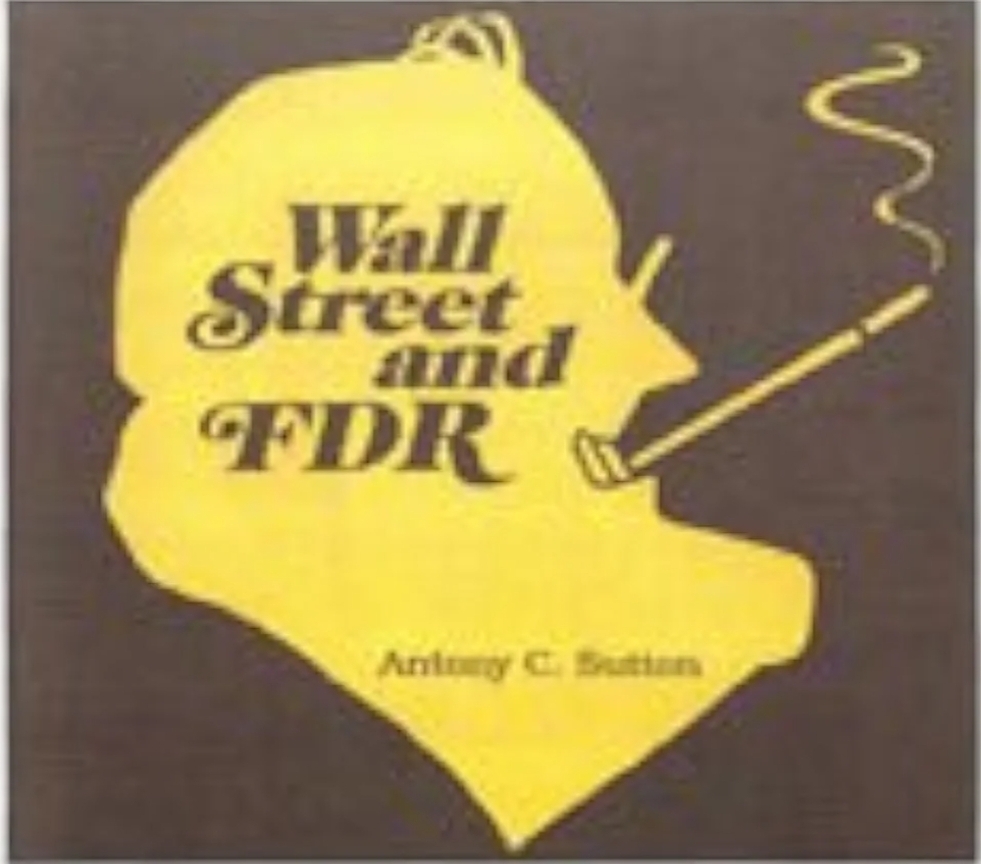Antony C. Sutton, a historian and author known for his critical views on U.S. economic and political history, discussed Franklin Delano Roosevelt’s presidency in several of his works. Sutton’s main critique of Roosevelt’s administration revolves around the influence of powerful financial and industrial interests, especially those connected to Wall Street and large corporations. Sutton’s analysis challenges the traditional view of Roosevelt as a champion of the common man, instead portraying him as someone who was influenced by elite interests, particularly during the New Deal and World War II.
Here are the key points Sutton makes about Franklin Delano Roosevelt’s presidency:
The New Deal and Corporate Interests:
- Sutton argued that Roosevelt’s New Deal, while publicly presented as a series of programs to help the average American during the Great Depression, actually served the interests of powerful financial and corporate elites. According to Sutton, many of the New Deal’s key programs were designed with input from industrialists and bankers, which ensured that they benefited from government intervention in the economy.
- Roosevelt’s policies, such as the creation of Social Security, unemployment insurance, and federal work programs, did provide relief for many Americans. However, Sutton believed that the larger objective was to increase government control over the economy and centralize power in Washington, which benefited large corporations that were well-positioned to work with the federal government.
Wall Street and Roosevelt’s Rise to Power:
- Sutton often referred to the influence of Wall Street in Roosevelt’s rise to power. Although Roosevelt is often seen as an adversary to big business due to his regulatory policies, Sutton argued that Roosevelt’s campaign and administration were backed by powerful financiers.
- According to Sutton, these financiers supported Roosevelt because they saw in him someone who would be able to stabilize the economy while ensuring that their interests were protected. For example, the National Recovery Administration (NRA) and other New Deal programs gave the government unprecedented control over private industry, but in a way that allowed big businesses to thrive and consolidate power.
Corporate Involvement in World War II:
- One of Sutton’s major critiques of Roosevelt was his handling of the lead-up to and involvement in World War II. Sutton argued that Roosevelt’s policies toward Germany, including his administration’s refusal to confront American corporations that were trading with Nazi Germany, reflected the influence of powerful financial interests.
- Sutton’s work, such as Wall Street and the Rise of Hitler, details how American corporations like General Electric, Ford, and Standard Oil had ties with Nazi Germany even after the U.S. had entered the war. Sutton contended that these corporations continued to do business with Germany because they were protected by influential figures within Roosevelt’s administration.
Roosevelt’s Foreign Policy and Economic Goals:
- Sutton claimed that Roosevelt’s foreign policy was also shaped by the interests of financial elites. He argued that Roosevelt’s interventionist policies in Latin America and Europe were designed to protect American financial and corporate interests rather than to spread democracy or defend human rights.
- According to Sutton, Roosevelt used the rhetoric of defending freedom and promoting democracy to justify interventions that benefited American businesses, especially those involved in oil, mining, and manufacturing.
Roosevelt’s Relationship with the Soviet Union:
- Another controversial argument made by Sutton was that Roosevelt had a cozy relationship with the Soviet Union, which he believed was also influenced by Wall Street interests. In his work Wall Street and the Bolshevik Revolution, Sutton examined how American financiers had supported the Bolshevik regime in Russia following the 1917 revolution.
- Sutton argued that Roosevelt’s diplomatic recognition of the Soviet Union in 1933 and his administration’s willingness to provide economic and military aid to Stalin during World War II were part of a larger strategy to maintain control over global markets, rather than a principled stand against fascism.
The Concentration of Power in the Federal Government:
- One of Sutton’s broader criticisms of Roosevelt’s presidency was the centralization of power in the federal government. Sutton believed that the New Deal and World War II policies allowed Roosevelt to expand executive power significantly, setting a precedent for future presidents.
- He argued that Roosevelt’s administration paved the way for the military-industrial complex and the deep state to thrive in the post-war period, giving rise to a more authoritarian style of governance that was increasingly influenced by corporate interests.
Antony C. Sutton’s analysis of Franklin Delano Roosevelt diverges sharply from the mainstream portrayal of FDR as a progressive reformer and champion of the working class. Instead, Sutton paints a picture of a president who was deeply influenced by Wall Street and powerful corporate interests. In Sutton’s view, Roosevelt’s New Deal programs and foreign policies were designed not just to help the average American but also to protect and enhance the interests of a small, elite group of financiers and industrialists. Through his critique, Sutton raises important questions about the intersection of corporate power and government policy during one of the most pivotal periods in U.S. history.







